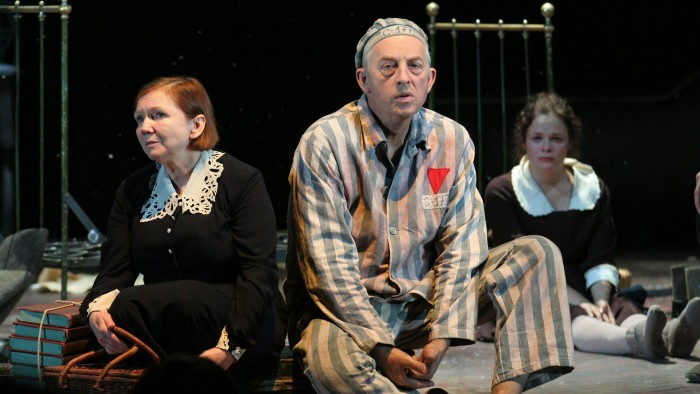Life and Fate, Theatre Royal Haymarket, London — epic yet intimate

Simply sign up to the Life & Arts myFT Digest -- delivered directly to your inbox.
To get an idea of the astonishing theatrical feat that is Lev Dodin’s adaptation of Life and Fate, first consider a few numbers. Vasily Grossman’s sprawling novel, banned in the Soviet Union for nearly 30 years, weighs in at almost 900 pages (in some editions) and deploys a cast of 150 characters to evoke the deaths of 20 million in the second world war. In this staging by St Petersburg’s Maly Drama Theatre, artistic director Dodin pulls off the trick of distilling Grossman’s epic panorama of 1940s Stalinist terror — from kitchen-sink drama to Gulag to the siege of Stalingrad — into just over three hours of theatre. That’s impressive for a work hailed as the 20th century’s War and Peace — though Grossman, who died in obscurity in 1964, didn’t live to see it published.
To achieve this, scenes have been cut and the cast is now a mere 25, but Dodin’s inventive magic turns on making a virtue of the novel’s fragmentary nature. Rather than try to shoehorn it all into a tidy linear narrative, he has intimate episodes in lovers’ beds overlap with tableaux of soldiers at the front and prison camp inmates cowering in the snow. What enables this seamless juxtaposition is a deceptively simple set design (by Alexey Poray-Koshits) with a wire fence cutting across the stage behind sparse items of furniture mothballed in pages from Pravda — Chekhovian in its evocation of domestic upheaval. Intimacy, the embrace of children, spouses and lovers, plays out against a visible backdrop of bloodshed and enslavement.
The set also points up the equivalence between Nazi and Stalinist atrocities — with both sides rounding up and slaughtering Jews — that got Grossman’s book banned, and when prisoners are corralled at the wire fence on stage, all that changes is the uniform and the language of their oppressors. As Mostovskoy, an old Bolshevik prisoner, tells SS camp commandant Liss, “You’re a monster”, to which Liss replies, “A mirror image of you.”
Dodin’s masterstroke, however, is to craft a series of agonising soliloquies out of a mother’s farewell letter to her son Viktor Shtrum, the Jewish nuclear scientist at the heart of the drama. Anna Shtrum, elderly and destined for the Nazi gas chambers, intersperses her long goodbye throughout the action, an emotional thread linking the fate of the Shtrum family’s members. As Anna, Tatiana Shestakova is simply magnificent: like a one-woman Greek chorus, her performance alone, unshowy yet heartbreaking, is worth the ticket price.
★★★★★
In Russian with English surtitles. To May 20, along with Chekhov’s ‘Uncle Vanya’ on May 15-17; maly2018.com, trh.co.uk
Comments